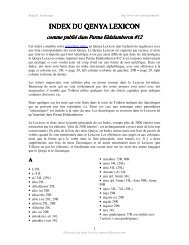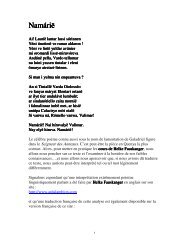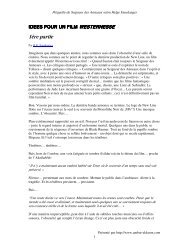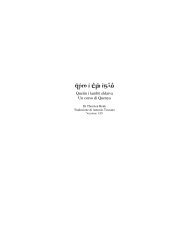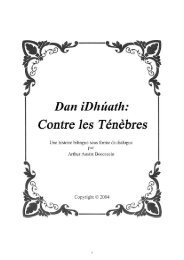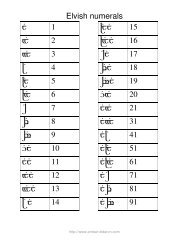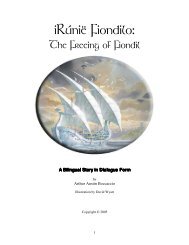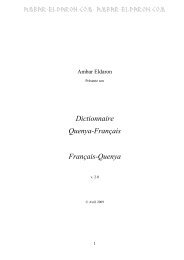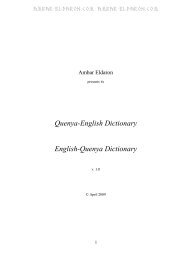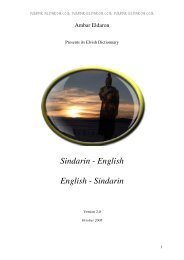Quenya Reverse Wordlist - Ambar Eldaron
Quenya Reverse Wordlist - Ambar Eldaron
Quenya Reverse Wordlist - Ambar Eldaron
You also want an ePaper? Increase the reach of your titles
YUMPU automatically turns print PDFs into web optimized ePapers that Google loves.
Helge K. Fauskanger http://www.uib.no/People/hnohf/<br />
rut tur- "wield, control, govern" (1. pers.<br />
aorist turin "I wield" etc.), pa.t. turnë (TUR)<br />
rutayniM Minyatur "First-ruler"; Tar-<br />
Minyatur "High First-ruler", title of Elros as the first<br />
King of Númenor (SA:minas, PM:348, SA:tur)<br />
rutnaeF #Fëantur pl. Fëanturi "Masters of<br />
Spirits", name of the two Valar Mandos and Lórien<br />
(SA:fëa, SA:tur)<br />
rutnaF Fantur "lord of cloud", surname of<br />
Mandos (SPAN, TUR)<br />
rutnafolO Olofantur "lord of Dream-cloud",<br />
surname of the Vala Lórien (ÓLOS, SPAN)<br />
rutnafuruN Nurufantur "lord of Deathcloud",<br />
surname of Mandos (SPAN, ÑGUR)<br />
rutsalaF Falastur masc. name, *"Shorelord"<br />
(Appendix A)<br />
s -s (1) pronominal ending "it", seen in<br />
tiruvantes and utúvienyes, q.v. May also be used for<br />
"he/she" as in eques; it seems that -s covers the entire<br />
3. person singular.<br />
s -s (2) ending for the mysterious case<br />
sometimes called "respective". Pl. -is, dual -tes,<br />
partitive pl. -lis.<br />
saf fas, fatsë "tassel" (GL:34)<br />
sakluT Tulkas (Tulkass-, as in dat.sg.<br />
Tulkassen) name of a Vala, adopted and adapted<br />
from Valarin (WJ:399, TULUK)<br />
salaf falas (falass-), falassë "shore, beach"<br />
(LT1:253, LT2:339); falassë "shore, line of surf"<br />
(SA:falas), "beach" (PHAL/PHÁLAS); Falassë<br />
Númëa "Western Surf" (LT1:253)<br />
salat talas "sole" (LT2:347; mature <strong>Quenya</strong><br />
has tallunë)<br />
sam -mas element in placenames, equivalent<br />
to English -ton, -by (LT1:251; may or may not be<br />
valid in mature <strong>Quenya</strong>)<br />
samoic coimas "life-bread" = Sindarin<br />
lembas (SA:cuivië, PM:395); coimas <strong>Eldaron</strong> "the<br />
coimas of the Eldar" (PM:395)<br />
sapóc [cópas] "harbour", see cópa, hópa.<br />
saracrac carcaras, carcassë ("k") "row of<br />
spikes or teeth" (LT2:344 - mature <strong>Quenya</strong> has<br />
carcanë, but these words, especially carcassë, may<br />
still be valid)<br />
saraynafrA Arfanyaras (*Arfanyarass-),<br />
Arfanyarassë a "variant or close equivalent" of<br />
Taniquetil (WJ:403)<br />
satlep peltas (peltax-, as in pl. peltaxi<br />
["ks"]) "pivot" (PEL, TAK)<br />
savat tavas "woodland" (LT1:267)<br />
sayricrA Arciryas masc. name (evidently<br />
derived from *arcirya "royal ship") (Appendix A)<br />
se es unidentified word in the phrase es<br />
sorni heruion an! "the Eagles of the Lords are at<br />
hand" (SD:290); possibly an assimilated form of en,<br />
62<br />
that may function as a kind of deitic particle here:<br />
*"Behold the Eagles..."<br />
selem meles, melessë "love" (LT1:262;<br />
rather melmë in mature <strong>Quenya</strong>)<br />
set -tes ending for dual "respective" (Plotz)<br />
seuqe eques (equess-, as in pl. equessi) "a<br />
saying, dictum, a quotation from someone's uttered<br />
words, a current or proverbial dictum" (WJ:392); I<br />
Equessi Rúmilo "the Sayings of Rúmil" (WJ:398)<br />
sewrein nierwes "hive" (LT1:262)<br />
seyneivútu utúvienyes see *tuv-<br />
si is "light snow" (LT1:256)<br />
si -is ending for plural "respective" (Plotz)<br />
sidni indis is translated "wife" in UT:8; but<br />
is assigned the meaning "bride" in other places; use<br />
rather vessë for "wife". Indis "Bride", name of the<br />
goddess Nessa (NDIS-SÊ/SÂ (NETH, NI 1 , NDER, I)<br />
); Indis Nessa *"Bride Nessa", title and name of the<br />
Valië (NETH)<br />
sil lis (liss-, e.g. dat.sg. lissen) "honey" (LIS)<br />
silap palis "sward, lawn" (LT1:264)<br />
silatseva avestalis "January" (LT1:252;<br />
mature <strong>Quenya</strong> has Narvinyë)<br />
silaV Valis "female Vala" (also Valdë)<br />
(LT1:272; in mature <strong>Quenya</strong> Valië)<br />
siliccileiN Nieliccilis ("k") "little Niéle"<br />
(MC:215; this is "Qenya")<br />
Silindo "Jupiter" (LT1:265; this planet is called<br />
Alcarinquë in mature <strong>Quenya</strong>)<br />
siliuqim miquilis ("q") "kisses" (noun)<br />
(MC:215; this is "Qenya")<br />
sín nís (niss-, as in pl. nissi) "woman"<br />
(MR:213. The Etymologies gives nis (or nissë) pl.<br />
nissi: see the stems NDIS-SÊ/SÂ, NI 1 , NIS (NÊR).<br />
However, the MR forms are to be preferred.)<br />
sinialaC Calainis ("k") "May" (LT1:252,<br />
254; in mature <strong>Quenya</strong> Lótessë)<br />
sirao oaris (oarits-), also oarwen,<br />
"mermaid" (LT1:263; read perhaps ëar- for oar- in<br />
mature <strong>Quenya</strong>)<br />
siriacA Acairis ("k") fem. name, "bride"<br />
(LT1:252; in mature <strong>Quenya</strong>, "bride" is indis)<br />
siric ciris ("k") "cleft, crack" (LT2:337 -<br />
obsoleted by cirissë?)<br />
sirit tiris "watch, vigil" (LT1:258)<br />
siuqil liquis ("q") "transparence" (LT1:262)<br />
siuqin niquis "frost-patterns", also niquessë<br />
by association with quessë "feather" (WJ:417). In<br />
early "Qenya", the gloss was simply "snow"<br />
(LT1:266).<br />
so os (ost-) "house, cottage" (LT2:336;<br />
hardly valid in mature <strong>Quenya</strong> - use coa or mar)<br />
sodnaM Mandos (Mandost-) "Castle of<br />
Custody" (the approximate meaning, according to<br />
MR:350) Used as the name of a Vala, properly the<br />
place where he dwells (the Halls of Mandos), while<br />
Presented by http://www.ambar-eldaron.com



